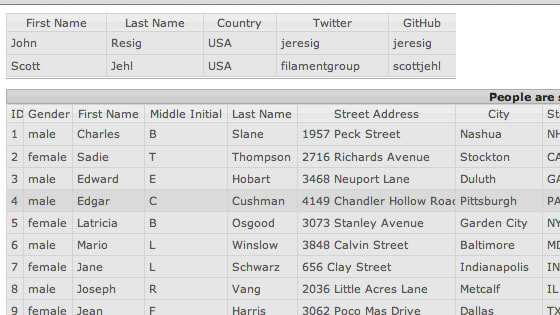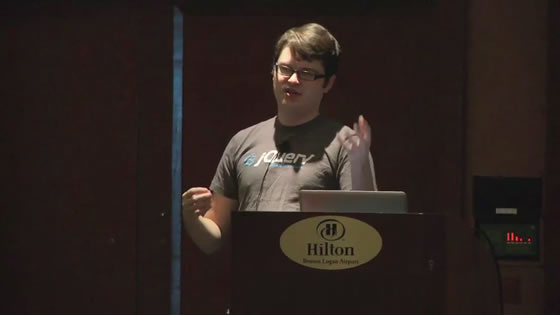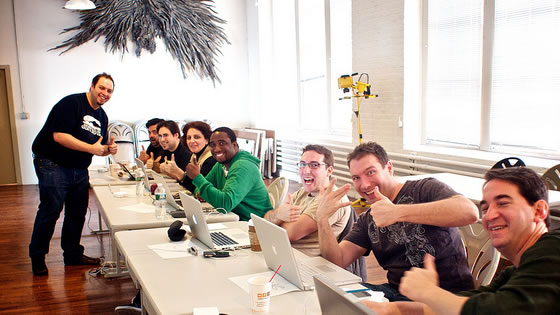Barely six months ago, we announced that we were adopting three plugins developed chiefly at Microsoft – Templating, Data Link, and Globalization – as official plugins, to be developed in accordance with the standards of and supported by the jQuery project. Today, we’d like to take an opportunity to share what we’ve learned in the interim and announce a change in course for these and the rest of jQuery’s “Official Plugins.”
There never has been a dedicated jQuery team for supporting Official Plugins. Prior to the adoption of Microsoft’s contributions, the plugins that the jQuery project supported – Color, Easing, bgiframe, Mousewheel, Metadata, and Cookie – were dead-simple, effective plugins for achieving a particular utilitarian end. They required little maintenance, stalwartly serving with little fuss from version to version of jQuery core. In recent months, as we noticed an uptick in questions related to the three new plugins, we realized there was a disconnect. Though development on beta versions of the plugins continued at Microsoft, the planned jQuery sub-team that was meant to collaborate with and adopt Microsoft’s work never formed.
As demand has grown, based on the existence of the beta versions of the plugins as well as promises made in the posts, we’ve sensed the rumbles, the confusion, and the confused exclamations: “I thought templating was going to be in 1.5!” Because of your concerns and ours, we’ve decided to eliminate the notion of Official Plugins altogether. It’s a difference that’s both semantic and symbolic, but this is its material impact:
Many of the original supported jQuery plugins (Color, Easing, and Mousewheel) will continue to be supported and maintained by the jQuery Core Dev Team. The Metadata plugin will be deprecated, in favor of similar functionality provided by jQuery 1.4.3 and above. The Cookie plugin will continue to be maintained by Klaus Hartl.
The jQuery UI project will take ownership over plugins on which it has a current or future dependency: Templating, Globalization, and bgiframe. The jQuery UI team plans to begin work anew on templating and globalization, starting with the normal process for UI plugins: Collaborative development on a spec. While some may perceive this as a setback, given existing progress on the current jquery-tmpl plugin, it is really an opportunity for us to work in tandem with the community — Microsoft included — to develop an implementation that will be effective and flexible. The “official plugins” Microsoft has been developing have always been in a beta state, subject to change and with significant revisions planned for the Beta 2 release, but we recognize (and appreciate) those of you who have jumped in and started to experiment and use them in your applications. The UI team is still in the early planning stages for the Templating and Globalization plugins, and we invite you to visit the planning wiki and share your thoughts about development.
Microsoft will continue to develop and support the Data Link plugin independently, and will take ownership of hosting the documentation for the existing plugins. In the short term, however, we’ll keep the documentation for these plugins on api.jquery.com, in order preserve a reference for anyone who needs it. For more on Microsoft’s plans for Data Link, please read their Official Plugins Update. We value Microsoft’s ongoing contribution to jQuery, providing developer time and financial support for a number of efforts, including the jQuery UI Grid and the jQuery conferences.
We realize that some of these details may seem in flux or merely organizational, but we know that it’s important to tell the community of changes like these as they’re happening so that you can make the best decisions for your applications as soon as possible. We hope you understand why we’ve had to make these shifts and encourage you to get involved and help us push these important projects along!
Addendum: So Why Weren’t Templates in 1.5?
Though we initially announced that the jquery-tmpl plugin would be part of jQuery Core in version 1.5, the plugin was, as it is today, still in the Beta 1 stage. Thus, when the time came last December to really evaluate new features for 1.5, it was not really considered ready for inclusion. Given what we’ve explained above, we hope it’s clear that we don’t plan to include templating directly in Core in the near future. The jQuery UI Templating plugin will be a standalone plugin with no dependencies on any other part of jQuery UI, and will become the only templating solution “officially” supported by the project, though jQuery will, of course, continue to work with any JavaScript templating engine that spits out good, old-fashioned strings of HTML.


 What started, with great demand, at the San Francisco Bay Area conference last year and has continued on for the conferences thereafter is our preconference training. We are once again offering preconference training on April 15
What started, with great demand, at the San Francisco Bay Area conference last year and has continued on for the conferences thereafter is our preconference training. We are once again offering preconference training on April 15 Bocoup gave a bunch of advanced and hack day training classes in Boston last year in addition to the preconference Introduction to jQuery class, which also was greatly attended. We are very happy to announce that Bocoup will once again be giving the Introduction to jQuery class.
Bocoup gave a bunch of advanced and hack day training classes in Boston last year in addition to the preconference Introduction to jQuery class, which also was greatly attended. We are very happy to announce that Bocoup will once again be giving the Introduction to jQuery class. New this year is an additional track for Advanced jQuery and we are happy to have Jupiter JavaScript Consulting give this class. JuptierJS builds and maintains JavaScriptMVC and has plenty of experience building complex jQuery apps.
New this year is an additional track for Advanced jQuery and we are happy to have Jupiter JavaScript Consulting give this class. JuptierJS builds and maintains JavaScriptMVC and has plenty of experience building complex jQuery apps.





